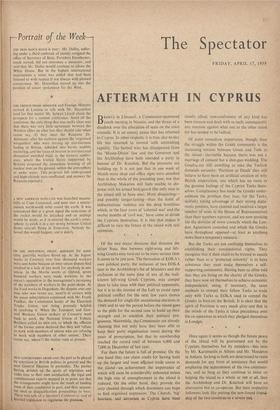—Portrait of the Week— THE IRON MAN'S REIGN is over
: Mr. Dulles, suffer- ing under a third outbreak of cancer; resigned the office of Secretary of State. President Eisenhower, much moved, did not announce a successor, and said that Mr. Dulles would continue to advise the White House. But in the highest international negotiations a voice was stilled that had• been listened to with respect it' not always with pleased concurrence. Mr. Macmillan moved up into the position of senior spokesman for the West.
THE FRENCH PRIME MINISTER and Foreign Minister arrived in London to talk with Mr. Macmillan (and for that matter Mr. Selwyn Lloyd) about the prospects for a summit cimference. Amid all the confusion, the only thing that was really clear was that there was very little agreement between the Western allies on what line they should take when (some say, if) they meet the Russians. Dr. Adenauer, after his outburst against the 'organised wirepullers' who were stirring up anti-German feeling in Britain, subsided into barely audible muttering, and the focus of interest in international discussion switched back to the Geneva confer- ence, where the. United States (supported by Britain) proposed the immediate banning of all nuclear tests on the ground, within the atmosphere or under water. This proposal left underground and high-altitude tests unaffected, and anyway the Russians rejected it.
*
A NEW AMERICAN SATELLITE -was launched success- fully at Cape Canaveral, and went into a ninety- minute north-south orbit round the earth. It was announced that at a given signal the nose-cone of the rocket would be detached and- an attempt would he made, as it re-entered the earth's atmo- sphere, to catch it in a net strung between United States aircraft flying in formation. Nobody be- lieved this would happen, and it didn't.
ON THE INDUSTRIAL FRONT, quiescent for some time, guerrilla warfare flared up. At the Jaguar works in Coventry over four thousand workers were sent home because an inter-union dispute had resulted in a lack of any work for anybody in any union. In the Morris works at Oxford, seven hundred workers were made workless by the union's opposition to the management's increasing of the numbers of workers in the paint-shops. At the Ford works in Dagenham, the dispute over one man who was (some say, wasn't) in arrears with his union subscriptions continued, with Mr. Frank Foulkes, the Communist leader of the Electrical Trades Union, not being precisely helpful in resolving it. When the Transport and Gen- eral Workers Union strikers at Coventry went back to work, the National Union of Vehicle Builders called its men out, to which the officials of the former union declared that they will 'refuse to work with members of unions who are refusing to work with members of other unions.' There (some say, where'?) the matter rests at present.
NEW CONTROVERSY AROSE over the part to be played by television in British politics in general and the next General Election in particular. The parties having divided up, the spoils pf lelpision and radio time to their own satisfaction, the legal and constitutional experts stepped in to point out that the arrangements might have the result of landing most of their candidates in gaol, and their success- ful Ones in disqualification proceedings to boot. 1 here was talk of a Speaker's Conference, and of hurried legislation to regularise the position.


































 Previous page
Previous page